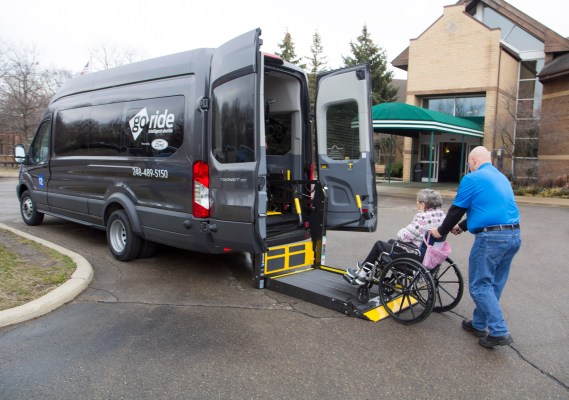Ford is launching an on-demand transportation service for non-emergency medical needs. The idea is to better help patients get to their doctor appointments. Ford is initially launching this in partnership with Beaumont Health in Michigan to serve more than 200 facilities.
Called GoRide, the fleet has 15 transit vans to accommodate people with varying needs. By the end of the year, Ford plans to have 60 vans, all driven by trained professionals, as part of GoRide’s services. The GoRide fleet can accommodate people with wheelchairs, thanks to flexible seats that can flip up and a wheelchair lift.
“There’s no excuse for the fact that so many people have trouble simply making it to their medical appointments,” Ford Mobility Business Group VP Marion Harris said in a press release. “By merging our expertise in vehicles, technology and human-centered design, we’ve created a high-touch, patient-focused service that truly understands and is tailored to patients and their needs. Our service is focused on multiple social determinants of health, and delivers the quality of care and on-time certainty that medical facilities need in order to increase throughput and reduce wait times.”
In March, Lyft committed to cut the problem of healthcare transportation in half by 2020. Lyft provides API access to partners like Allscripts, Blue Cross Blue Shield and Ascension to integrate the ride-hailing service into its health platforms and electronic health records services.
Meanwhile, people seem to be moving toward on-demand platforms for trips to the emergency room, as well. Last December, a study reported ambulance use has gone down about 7 percent nationwide since the rise of Uber.
Though, neither Uber or Lyft are particularly accessible to people with mobility disabilities. In March, Disability Rights Advocates, on behalf of the Independent Living Resource Center and two people who use wheelchairs, filed a class-action lawsuit today against Lyft. The plaintiffs allege the ride-hailing company discriminates against people who use wheelchairs by not making available wheelchair-accessible cars in the San Francisco Bay Area. Uber also faces a number of lawsuits pertaining to the lack of services it offers to people with mobility disabilities.
In Ford’s pilot program with Beaumont Health, GoRide was on schedule 92 percent of the time in regards to pick-ups and drop-offs. The average wait time for on-demand pick-ups for those needing wheelchair transport was between 10 to 30 minutes.
In a statement, Beaumont Health’s Paul E. LaCasse said, “This is precisely what we needed to improve access to medical care at Beaumont’s facilities for our patients who are elderly, in wheelchairs or have mobility challenges.”
